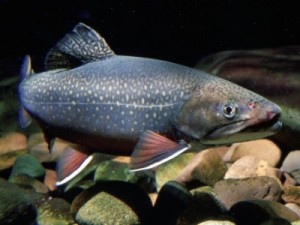The U.S. Fish and Wildlife Service (USFWS) and the National Fish and Wildlife Foundation (NFWF) have awarded the Maryland Department of Natural Resources (DNR) two grants through the Chesapeake Watershed Investment for Landscape Defense (Chesapeake WILD) program.
Grant funds will support comprehensive conservation strategies including targeted reintroduction efforts for two freshwater fish species listed as species of greatest conservation need within Maryland’s State Wildlife Action Plan.
The two species, blackbanded sunfish and eastern brook trout, each require specific habitats with good water quality driven by healthy landscapes. Protecting and restoring the lands and waters these species rely on is critical to their persistence into the future. As part of these two projects, DNR will plant nearly 20,000 trees, which also supports Maryland’s 5 Million Trees initiative.
“Through these Chesapeake WILD-funded projects, DNR and its partners will undertake conservation efforts that reconnect and restore aquatic habitat, while engaging communities directly in creating a healthier future for the Chesapeake Bay watershed,” said Coldwater Fisheries Biologist Matt Lawrence.
Maryland DNR has been awarded $313,800 and will supply $250,400 in matching funds for the following projects:
Building Capacity for Rare Freshwater Fish Conservation in the Chesapeake Bay, $86,300
The Maryland Department of Natural Resources and partners seek to prevent the loss of blackbanded sunfish – through habitat restoration, fish translocation, captive breeding, and reintroduction. The species is extremely rare in the Chesapeake Bay watershed.
DNR will add fish to the only known population of blackbanded sunfish remaining within the watershed to improve genetic health. The project will also work to establish a new population by bringing in healthy individuals from neighboring states, establishing two propagation facilities, assessing habitat conditions at ten sites, and engaging eight community organizations in planning sessions.
Once known from swampy streams and millponds within the Delaware, Choptank, Nanticoke, Wicomico, and Pocomoke river basins on the Delmarva Peninsula, the Blackbanded Sunfish has declined over the past 50 years and is now exceedingly rare in Maryland and Delaware.
In 2008, biologists from the Maryland Department of Natural Resources, Frostburg State University, Delaware Division of Fish and Wildlife, and other agencies initiated an interstate conservation action strategy in response to the regional decline of blackbanded sunfish.
Partners on this project include The Nature Conservancy, National Aquarium, University of Florida Tropical Aquaculture Laboratory, New Jersey Department of Environmental Protection, Delaware Department of Natural Resources and Environmental Control, and U.S. Fish and Wildlife Service.
Conserving Brook Trout Populations in Maryland, $477,900
The Maryland Department of Natural Resources is leveraging established partnerships and forming new ones to conserve and protect eastern brook trout.
DNR will provide long-term reinforcement to Maryland’s most robust native trout population by planting trees and protecting land within the Savage River and adjacent watersheds. Added efforts will improve aquatic organism passage, maintain access to a municipal water supply, and engage underserved youth. Finally, using detailed field assessments, DNR will reintroduce new brook trout populations within viable currently unoccupied coldwater habitats.
DNR’s project partners include Western Maryland Resource Conservation and Development Council, Trout Unlimited, Frostburg State University, Allegany County Chapter of the NAACP, Midlothian Water Company, Garrett County Government, U.S Fish and Wildlife Service, and The Nature Conservancy.
source: Maryland Department of Natural Resources
